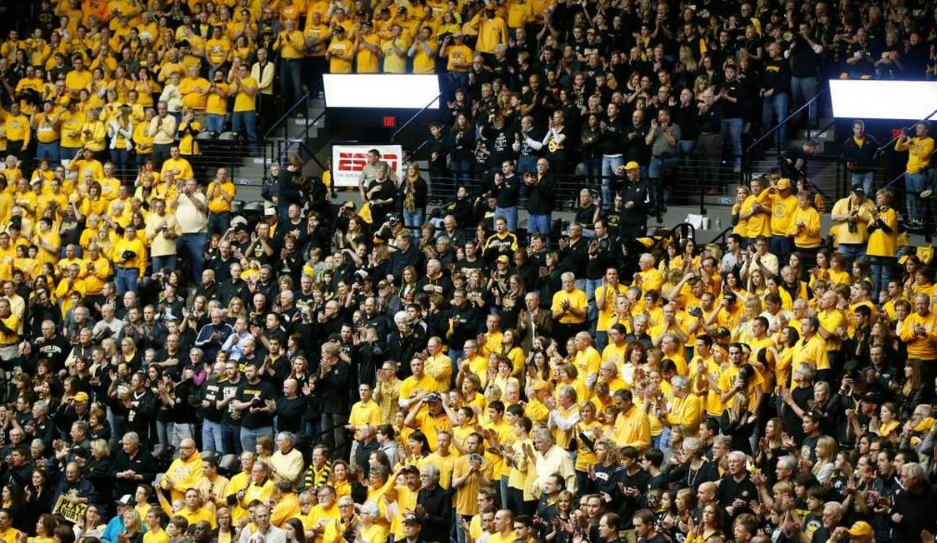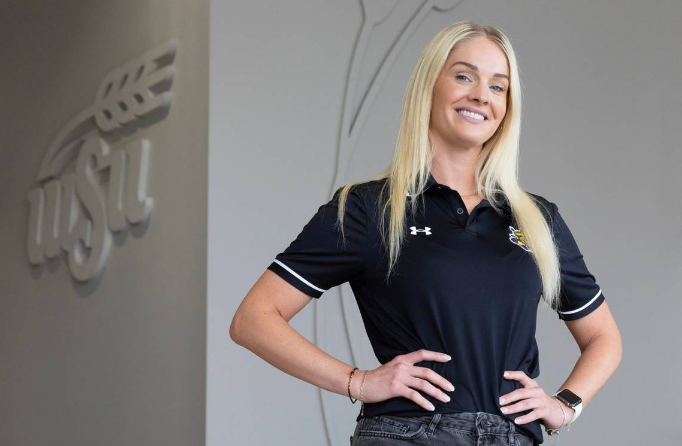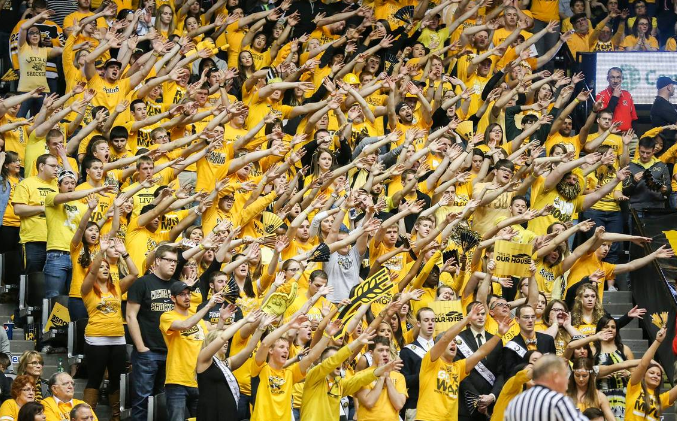
There was a time when Wichita State was a key player in the name, image, and likeness (NIL) landscape, particularly during their heyday as favorites in March Madness. However, it has been seven years since their last NCAA Tournament victory in men’s basketball, and when NIL officially launched in 2021, WSU was slower than many in establishing a collective to support its athletes financially.
Essentially, Wichita State fell behind in the competitive landscape of college sports. Since Kevin Saal became athletic director in July 2022, he has been focused on closing this gap. In his first two years, Saal has worked to revamp WSU’s collective, which recently collaborated with Blueprint Sports, rebranded as Wheat Shock Collective, and hired Emily Hiebert—a former standout volleyball player with Hall of Fame honors—as a full-time general manager.
While WSU has made strides since its initial setbacks, there is still much work and winning ahead to fully realize its potential in the NIL arena. Tapping into that potential could be crucial for Wichita State’s success in the evolving landscape of college athletics. Now, it’s up to Saal and Hiebert to make it happen. “Everyone wants to be part of something bigger than themselves, but it has to make them proud,” Saal said. “We need to make progress toward that goal, and we’re actively working on it. As you’ve heard before: When Wichita State wins, it benefits the entire community. We need to get back to that.”

‘They stepped in at a time of need’
When former WSU baseball players Tyler Weber and Tymber Lee came together to establish the first collective for WSU, they never planned for Armchair Strategies to be a long-term operation. They recognized a need and created a solution but each had full-time jobs and were active in the Wichita business scene. Armchair was primarily a passion project. “We never saw it as a way to make money or create a profit for ourselves,” Weber explained. “We all have a deep affection for Wichita State. I graduated from there and played baseball; my wife did too, and so did Tymber. From the start, our goal was to elevate NIL to a level that needed dedicated, full-time attention.”
Armchair found early success in April 2022 when it crafted an NIL package that persuaded men’s basketball standout Craig Porter Jr. to remain with the team rather than transfer. However, Weber (from Aegis Group) and Lee (from Wichita Sports Forum) mainly relied on their own businesses to make the deal happen—a recurring theme in the collective’s first year. They faced some backlash from fans who alleged online that the collective was taking 20% of donations. Weber clarified that while the contracts allowed for up to 20% to be taken, it was rarely the case. He also mentioned that none of the founders profited when Armchair sold to Blueprint Sports, and Saal praised Weber and Lee for investing their own resources to get the collective off the ground. “The Armchair founders stepped up when we needed help and did a great service for the institution,” Saal commented.
After Saal’s hiring, the WSU athletic department became more actively involved with Armchair. He focused on educating student-athletes about NIL, established a marketplace for them via Opendorse, and helped secure the first external NIL funds for the collective in January 2023, when three donors pledged a total of 450,000overthreeyears.Bythecollective’ssecondyear,SaalnotedthatWSUprogressedfromhavingnothingtobeingabletodistributearound 320,000 in NIL funds to its men’s basketball players. This year, Saal indicated that there’s “substantially more” available, which should place WSU in the upper tier of the American Athletic Conference. According to Opendorse, the projected average NIL distribution for men’s basketball in the AAC this season is $ 500,000. It became clear to Weber and Lee that the collective required full-time leadership.
Hiebert quickly emerged as their ideal candidate. After completing a celebrated volleyball career at WSU in 2017, she had been teaching physical education and coaching high school volleyball, which some might view as lacking the typical business or fundraising experience for such a role. However, her strong standing in the WSU community—having been inducted into the Shocker Hall of Fame in 2023—made her uniquely qualified. At just 29, she could also connect with current student-athletes effectively. She was hired in June, just in time for the 2024-25 school year. “While she lacked direct experience in the NIL sphere, we knew she could forge strong relationships with boosters and alumni because of her name recognition,” said Weber. “The more we interviewed her, the clearer it became that she was the perfect fit.”
What began as a heartfelt initiative for Weber and Lee—an opportunity to give back to their alma mater—has transitioned into a mission they feel is best carried forward by another former athlete who understands the significance of Shocker sports to the Wichita community. “Wichita State athletics has profoundly impacted my life,” Hiebert shared. “It’s incredible to return in this role and contribute in any way I can, as I want to see our athletes thrive and succeed.”

‘She has that instant trust and credibility’
The extent of schools’ involvement in NIL processes is still changing with each court ruling, but one thing is clear: having a full-time specialist on campus is beneficial. Wichita State has embraced the trend of not only funding a full-time NIL general manager but also incorporating this role into their athletic department. WSU struck a deal with Blueprint Sports allocating 90% of each NIL dollar donated directly to student-athletes, while the remaining 10% covers administrative expenses. Although Hiebert is officially employed by Blueprint Sports, her office is located in Koch Arena, right next to senior administration. This proximity allows her to easily approach colleagues like Saal, Madison Stein-Mason (external affairs), Kent Hegenauer (business operations), Brad Pittman (facilities and operations), and Taylor Spyker (health and performance) for assistance. “It’s been incredibly helpful for my learning,” Hiebert stated. “They’re literally just a few steps away, so I can pop in their office anytime with questions. They’re always ready to support me.”
In the fast-paced world of NIL, Hiebert’s days are anything but predictable. When she’s not tracking policy changes, court rulings, or portal activities, she’s engaged in fundraising, event planning, and collaborating with WSU head coaches. Partnering with Blueprint Sports, which manages several other collectives, provides Hiebert access to other NIL general managers, allowing her to ask specific questions or discuss daily operations. One of her favorite aspects of her role has been organizing opportunities for Shocker athletes to complete their NIL commitments by volunteering with local nonprofits. This summer, WSU athletes dedicated time to organizations like Wichita Children’s Home, Starkey, Kansas Food Bank, American Legion, YMCA, and Habitat for Humanity. “It’s been incredible to witness their impact on the community,” Hiebert remarked. “It’s also rewarding to see how this work benefits our student-athletes.”
In this new role, there’s plenty to learn, but Hiebert has shown a natural knack for relationship-building. Saal has observed that her background as a former Shocker athlete enhances her credibility with young people. “The credibility of being a Shocker and an ex-athlete has had a significant impact here,” Saal noted. “She instantly earns trust and respect. Plus, she’s proactive—nothing sits on her desk for long. As an educator, she brought expertise from teaching young people, which aligns with our mission of education.”

“WICHITA RESIDENTS ENJOY WINNING”
Hiebert faces a significant challenge, as many donors are hesitant to embrace NIL. Having been conditioned to believe that paying players was wrong, some boosters struggle to adapt to this change. Others are discouraged by the notion that funds may support athletes’ extravagant spending, while a few simply oppose the idea of compensating players altogether. Hiebert’s main task is to persuade these skeptics and open previously closed doors. “This is a crucial moment for Wichita State to remain competitive with other schools nationwide,” Hiebert stated. “While some may not agree with NIL, it is now a reality. To stay in the game, we must continue to work on and expand our efforts.”
Saal views it in stark terms: schools either adapt or risk being left behind. “You can’t separate championship programs from NIL in today’s landscape,” he emphasized. “We can desire championships and oppose NIL, but those two cannot coexist. Winning championships requires integrating NIL in some way. There’s a minimum investment needed for effective recruiting, so we must embrace this, and Emily is here to facilitate that.”
According to Saal, WSU’s collective needs to reach $ 2.5 million to position men’s basketball, baseball, volleyball, women’s basketball, and softball in the top third of the American Athletic Conference, enabling the Shockers to effectively recruit, develop, and retain talent for championship contention. Saal and Hiebert are approaching this challenge like a head coach rebuilding a team. “When rebuilding, you start by promoting yourself and your vision,” Saal explained. “You highlight our core values, student-athlete development, and championship aspirations. It’s similar to recruiting. Some people will generously contribute upfront, while others will wait to see results, and that’s okay.”
Ultimately, Hiebert and Saal’s ability to sell their vision for WSU will hinge on the Shockers’ success. While Saal notes there has been “significant” growth in donations, he acknowledges that there is still “a long way to go.” The fastest route to boosting support, especially in men’s basketball, is for the team to start winning. “You can promote core values and program pillars, but when success is evident, it lends credibility to what you’re advocating,” Saal remarked. “As we work toward this goal, success will create momentum that attracts more support.”
Weber, after two years of engaging with WSU fans within the business community, has sensed a strong desire for the Shockers to regain their prominence in men’s basketball. Fans long for the excitement of 30-win seasons, championships, and NCAA tournament appearances. He is optimistic about Saal and Hiebert’s efforts, believing that if WSU shows any signs of returning to that level of success, the collective will flourish as a result. “People in Wichita like to win. This is a community of entrepreneurs and successful business owners,” Weber said. “We’ve seen it before: when we have strong teams, fans come out to support. They want to see winners on the court and field, and they’re eager to contribute financially. This creates immense potential for NIL here.”

Leave a Reply